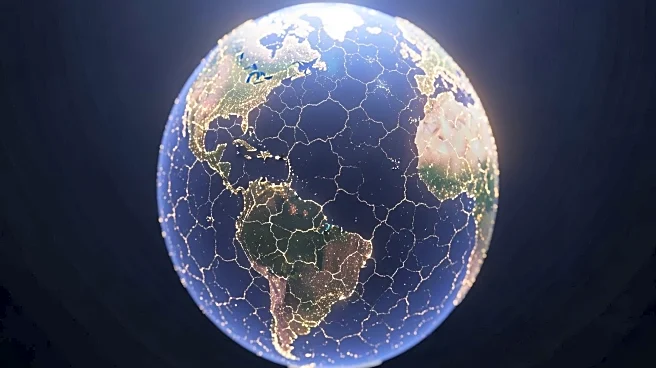What's Happening?
The World Meteorological Organization (WMO) has reported a record surge in global carbon dioxide levels, marking the largest yearly increase since modern measurements began in 1957. The concentration of
CO2 rose by 3.5 parts per million from 2023 to 2024, surpassing the average increase of 2.4 ppm observed between 2011 and 2020. This rise is attributed to increased emissions from human activities and wildfires, coupled with a diminished capacity of land and oceans to absorb carbon. Methane and nitrous oxide levels also reached record highs, with methane concentrations up 166% compared to preindustrial times. The WMO highlights the role of fossil fuel emissions, which constitute about 80% of carbon pollution, and notes that these emissions may have peaked last year. However, the exceptional wildfire season in South America, particularly in Bolivia and Brazilian states, contributed significantly to the CO2 increase.
Why It's Important?
The record increase in greenhouse gases is exacerbating climate change, leading to more extreme weather events that have resulted in thousands of deaths and billions in economic losses annually. The breach of the 1.5 degrees Celsius temperature rise threshold set by the Paris Agreement underscores the urgency of reducing emissions. The WMO emphasizes that reducing emissions is crucial not only for climate stability but also for economic security and community well-being. The diminished effectiveness of terrestrial and ocean CO2 sinks raises concerns about accelerated global warming, which could further impact ecosystems and human societies.
What's Next?
The potential decline in fossil fuel emissions this year offers a glimmer of hope, but the impact of wildfires could offset these gains. The WMO suggests that ongoing monitoring and adaptation strategies are essential to mitigate the effects of climate change. Policymakers and environmental groups may push for more aggressive emission reduction targets and investment in carbon capture technologies. The international community is likely to face increased pressure to adhere to climate agreements and implement sustainable practices.
Beyond the Headlines
The report highlights the complex interplay between natural phenomena like El Niño and human-induced climate change, which can exacerbate environmental challenges. The ethical responsibility of nations to address climate change and support vulnerable communities is becoming increasingly prominent. Long-term shifts in agricultural practices and energy consumption may be necessary to reduce the environmental footprint and ensure a sustainable future.










